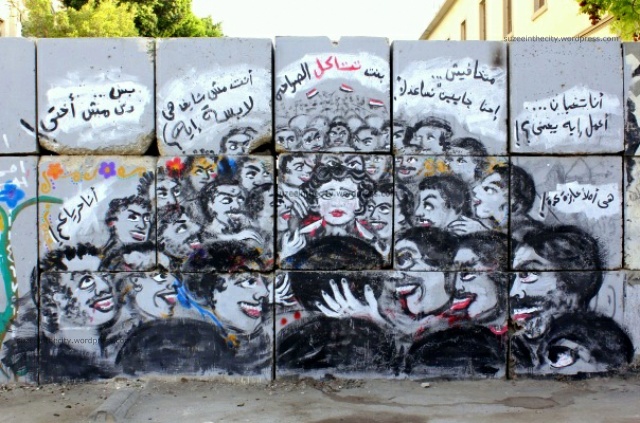
Eman Al Obeidy burst into a hotel dining room in Tripoli, Libya, on Saturday, and struggled to tell the story of how she’d been raped and beaten, for two days, by Qaddafi’s forces. She was then attacked, in the hotel dining room, and carried out. Journalists present were disturbed, as much by the treatment they witnessed as by Al Obeidy’s account. The latest report suggests that she is being held hostage at Qaddafi’s compound in Tripoli.
Salwa al-Housiny Gouda was one of the proud citizens of Tahrir Square, in Cairo. She was also one of seventeen women, arrested by the Egyptian army, imprisoned, tortured, stripped and subjected to a `virginity test.’
These women’s stories are critical to any understanding of the ongoing struggles in particular places, such as Libya, such as Egypt. They are also part of the treatment of women in prisons around the globe. There are more prisons and jails now then ever before, and women are the fastest growing prison population, globally and in many regions of the world. Across the world, nation states rigorously refuse to address sexual violence. At the same time, across the world, nation states build more prisons in which sexual violence against women intensifies and spreads.
From the United States to Jamaica to South Africa and beyond, rape kits sit unprocessed for months, some times years. In the United States, many cities, such as Los Angeles and Chicago, have failed to process rape kits in a timely manner … if at all. When called to task for the failure, the administrations stonewall or, if forced to reform, drag their feet. Illinois just this past week passed a law “that will force law agencies to submit DNA evidence for testing.” They had to pass a law to make agencies process DNA. In New Jersey, also last week, the State legislature passed a law banning the practice of charging rape victims for the cost of processing the rape kits.
In Jamaica, rape survivors wait an average of two years for their attackers’ cases to be heard. In South Africa, the State has failed to adequately educate police about the appropriate procedures to follow in cases of sexual violence. Sometimes the training is a pro forma run through, with little follow up or evaluation. More often, there’s no training at all.
This is the state of the world. This state is made most manifest in the asylum and immigrant detentions centers. When the United Kingdom set up its fast track asylum processes, it did so with complete disregard for the women asylum seekers who are fleeing sexual violence. For example, one woman applied for asylum. She was part of a dissident movement in Angola, had been tortured, raped, and suffers from post traumatic stress syndrome, among other mental issues. The first official to hear her case, in 2008, decided she was `lying’. She was detained at Yarl’s Wood, despite compelling evidence of both torture and mental illness. All part of the system.
This is just one of many such tales. The asylum system has been described as “simply not equipped to handle rape, slavery, the threat of ‘honor killings,’ or other complex claims”. The simplicity of being unequipped is this: the state chooses not to equip, because women, and especially women of color, don’t matter.
At the same time, women prisoners suffer sexual violence at the hands of prison staff. Jan Lastocy is a woman prisoner in the United States, and hers is a typical story. She was raped, repeatedly, by a corrections officer. The warden made it clear that any reports of problems tagged the prisoner as a troublemaker. Lastocy was a few months from release. For seven months, three or four times a week, the prison guard raped Jan Lastocy. Terrified and desperate, she kept her silence. Upon release, she reported the assaults, and now suffers a sense of great and intense guilt for her silence. According to recent US government studies, the vast majority of sexual violence committed in prisons is committed by the staff.
Prison rape is a human rights crisis in the United States today. It is a crisis in juvenile prisons. It is a crisis in women’s prisons across the globe. This crisis is not accidental nor is it exceptional. It is the crisis of predictable consequence. Rape today is being used in Libya as a weapon. That is terrible. Rape has been used, across the globe, as a tool in the construction of so-called criminal justice systems, in the construction of more prisons with more women prisoners. That too is terrible, and to continue to claim shock and surprise at the use of rape is unacceptable. State sexual violence haunts the world.
(Photo Credit: suzeeinthecity/ Mira Shihadeh and El Zeft)